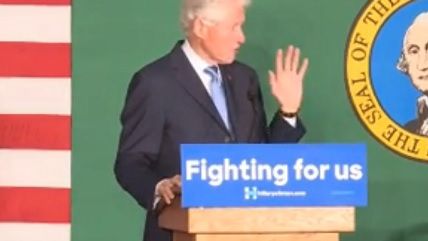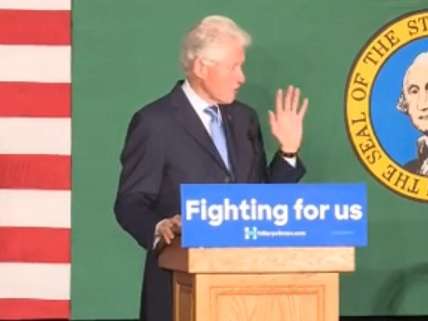Bill Clinton Says Very Bill Clinton Things on Campaign Trail for Hillary
Wants people to get behind Hillary instead of debating past policies.


Former president Bill Clinton spoke at a Hillary Clinton campaign event in Spokane, Wash., earlier today, where he talked about "the awful legacy of the last eight years" and how Hillary was the "best change maker" he'd ever known.
An especially Clintonian portion of his comments, via The Weekly Standard:
She always finds a way to make something good happen, to make people feel empowered, to buy people into the process, to make democracy work the way the framers intended for it to work. Now if you don't believe we can all grow together again, if you don't believe we're ever going to grow again, if you believe it's more important to re-litigate the past, there may be many reasons that you don't want to support her.
Where to start? Saying that Hillary is good on getting people to "buy in" to the political process shows either a stunning lack of self-awareness or a stunning lack of caring. The Clinton Foundation looks a lot like a slush fund that facilitated dirty deals with foreign governments while Hillary Clinton served as secretary of state in the Obama administration.
Not sure who Bill Clinton believes doesn't believe the U.S. can "grow again," while "we can all grow together again" is a "building a bridge to the 21st century"-level of bullshit.
The line that stuck out for me was about believing it's "more important to re-litigate the past." This is a favorite refuge of political scoundrels. Clinton's record as president in the 90s has become somewhat of an issue on the Democratic campaign trail.
Bernie Sanders has made re-instating Glass-Steagall (briefly, a law separating commercial banking from investment banking) one of his campaign themes, arguing against all evidence to the contrary that the repeal helped precipitate the 2008 financial crisis.
Meanwhile, the 1994 crime bill has emerged as an issue in the context of policing and criminal justice reform. Bill Clinton finally apologized for signing the bill into law last year, as his wife's Democratic nomination began to appear slightly less inevitable. Hillary and her apologists have argued that the 90s were a "long time ago" and that a different set of political realities informed the crafting of that bill. In other words: it was politically popular back then and offered few negative consequences.
But that kind of hand-waving and excuse-making avoids introspection. Without identifying the fallacies about the role of government and the use of force to compel compliance that led to the crime bill in the first place, the same mistakes are bound to repeat. That's especially true when politicians, as they often do, escape any personal responsibility for the misery they cause through legislation. Engaging that is not "litigation," and that doesn't depend on the definition of is.


Show Comments (60)